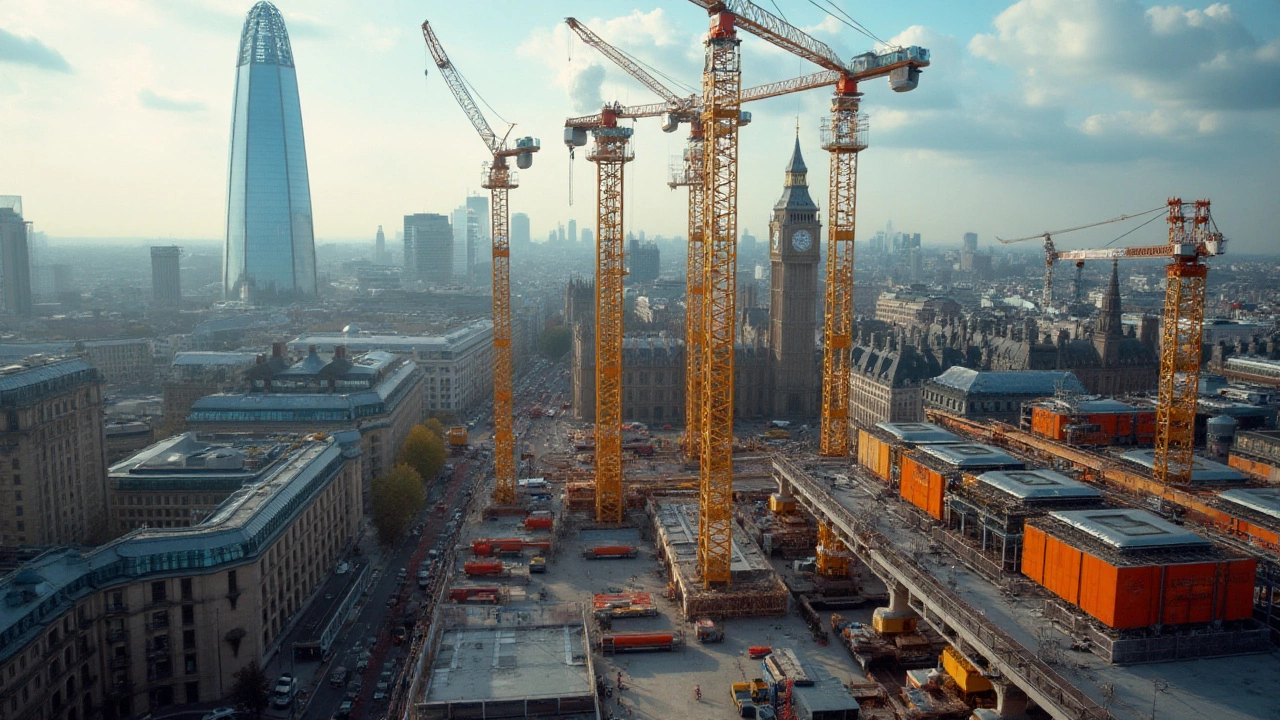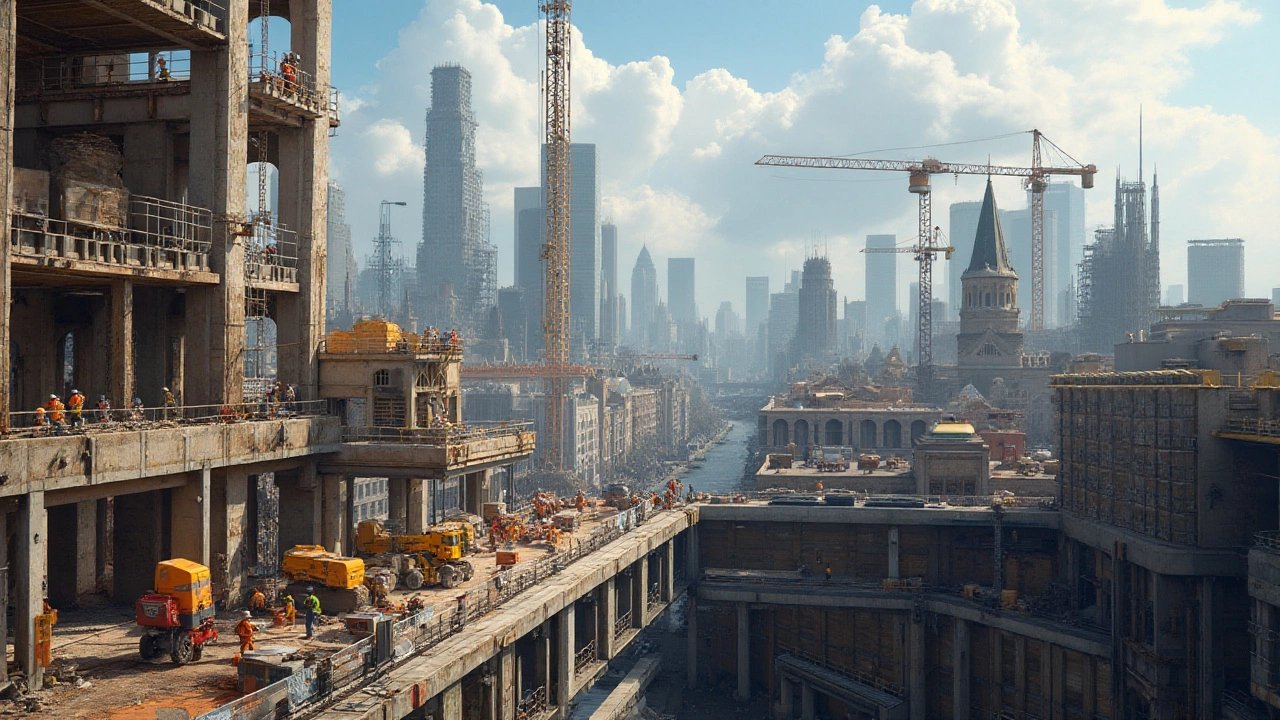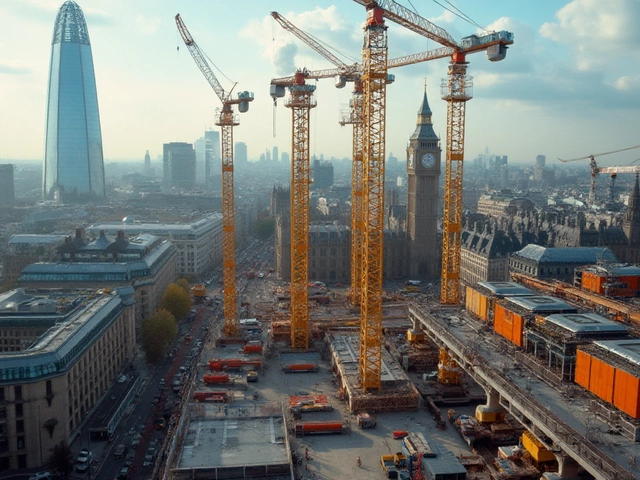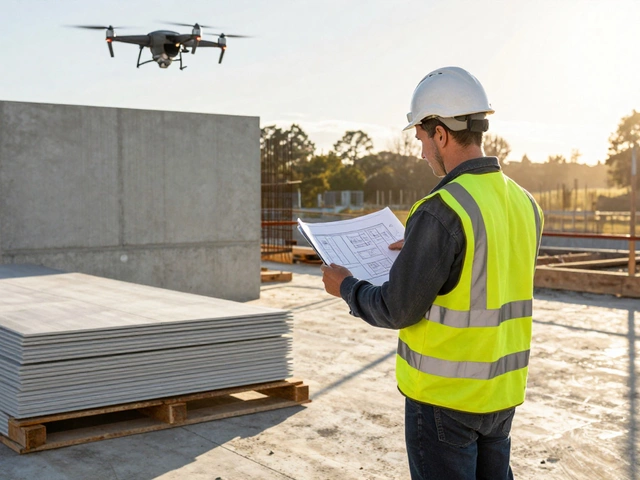Understanding the Role of Tier 1 Building Contractors

In the bustling world of construction, the term Tier 1 contractor often pops up, associated with the giants of the industry. These are the firms handling multi-million dollar projects, the towering skyscrapers, and the sprawling infrastructure works that shape our cities. But what does it really mean to be a Tier 1 contractor, and why are they integral to the industry?
Tier 1 contractors are the heavyweights, possessing the ability, resources, and reputation to manage the most complex construction demands. These companies are not just builders; they are planners, innovators, and leaders who can bring massive visions to life. Delving into their role offers insight into how such firms drive growth and maintain excellence in construction.
- Defining Tier 1 Contractors
- Key Responsibilities and Projects
- Distinguishing Features of Tier 1 Contractors
- Choosing a Tier 1 Contractor for Your Project
Defining Tier 1 Contractors
When we speak of Tier 1 contractors, we are referring to the elite companies in the construction sector that have the proven capability to oversee and deliver substantial construction projects. These are not your everyday builders. Much like the A-list celebrities of the construction world, Tier 1 contractors have a prominent reputation for handling projects that significantly impact the landscape of urban development. Their clientele often includes governments, multinational corporations, and other heavy hitters who require the finesse and reliability these contractors bring to the table.
The classification of a Tier 1 contractor is primarily based on factors such as revenue, project scale, and the diversity of services offered. Typically, these contractors possess a vast array of resources including skilled personnel, advanced technology, and extensive machinery, allowing them to efficiently manage the various phases of large-scale projects, from the initial planning stages to final execution. According to a report by the Global Construction Review in 2023, contractors in this league control over 30% of the global construction market, a testament to their significant influence and capacity.
Such organizations often operate with a collaborative approach, partnering with architects, engineers, and subcontractors to bring complex designs to fruition. Their influence is particularly felt in large infrastructure projects such as highways, bridges, airports, and expansive residential developments. For instance, renowned companies like Bechtel, Fluor, and Turner Construction have consistently illustrated the sheer expertise that defines a Tier 1 contractor.
"The ability to mitigate risks while innovatively adapting to technological advancements is what sets Tier 1 contractors apart," notes Donald Smith, a renowned construction analyst.
One differentiating factor of these contractors is their commitment to sustainability and safety, often setting benchmarks for industry standards. Tier 1 contractors are at the forefront of implementing green building practices and adhering to environmental regulations, ensuring that their projects not only meet legal requirements but also contribute to reducing the carbon footprint. Their safety standards are stringent, minimizing accidents and ensuring that all personnel work in a secure environment. As the construction landscape evolves, most Tier 1 contractors invest in research and development to stay ahead, engaging in practices that improve efficiency and sustainability.
The decision to engage with a Tier 1 contractor is usually strategic, as their experience and resources significantly mitigate the risks associated with large-scale construction projects. They excel in project management, integrated logistics, and have a vast network of professional relationships that can be leveraged to ensure project success. For stakeholders, choosing a Tier 1 contractor often means the difference between a good project and a great one, delivering not just on time, but also within budget and to the highest possible standards of quality.

Key Responsibilities and Projects
When it comes to Tier 1 contractors, their responsibilities extend far beyond just putting brick to mortar. These industry leaders are tasked with managing the entirety of large-scale construction projects, from initial design and engineering to completion and maintenance. Their projects often encompass vast infrastructure endeavors such as highways, bridges, and skyscrapers, which require a strategic approach and an eye for meticulous detail.
A significant responsibility of Tier 1 contractors is the management of complex supply chains and project timelines. Demonstrating exceptional organizational skills, these contractors coordinate with numerous specialized subcontractors and suppliers, ensuring that materials and labor meet the demanding schedules and quality standards. Their expertise allows for the seamless operation of various construction phases, reducing project delays and optimizing resource utilization.
Additionally, financial management plays a crucial role in their portfolio. Tier 1 contractors handle multi-million or even billion-dollar budgets, where precise calculation and forecasting are mandatory. They must secure funding, manage expenditures, and ensure that projects remain within budgetary constraints. This requires sound judgment and often innovative financial strategies to maintain cash flow and profitability without compromising on quality. An often-cited quote from a veteran in the field explains,
"Managing finances in construction isn't just about balancing books; it's about anticipating the unforeseen and planning accordingly."
Another key responsibility involves ensuring compliance with all regulatory and legal requirements. Tier 1 contractors navigate a complex framework of local, national, and sometimes international regulations. They must ensure that every aspect of construction adheres to safety standards, environmental guidelines, and zoning laws. This not only includes the current benchmarks but also involves projecting future restrictions and adjustments to maintain compliance throughout the project's lifecycle.
Projects managed by Tier 1 contractors often reflect societal advancements and meet public needs. Consider the intricate network of a city's transportation system or a flagship hospital project; these are tangible outputs where Tier 1 contractors leave their marks. Their influence extends beyond mere construction, playing a pivotal role in urban planning and development, significantly impacting economies and communities.
Their importance in the construction industry cannot be overstated, as they are often the pioneers in integrating technology and sustainable practices in projects. By adopting cutting-edge technology like Building Information Modeling (BIM) and embracing sustainability, these contractors not only enhance construction efficiency but also ensure longevity and ecological balance. This emphasis on innovation, combined with their comprehensive skill set, is what firmly categorizes them as Tier 1.
To sum up, Tier 1 contractors carry a hefty load of responsibilities that require them to be more than just builders. They are visionaries, strategists, and leaders who transform architectural wonders and critical infrastructures from blueprints to reality. These contractors define the skyline and the quality of life for communities worldwide, reinforcing the infrastructure of our daily lives while paving the way for the future of construction.

Distinguishing Features of Tier 1 Contractors
When one delves into the realm of Tier 1 contractors, it becomes readily apparent that these entities are not just spearheading projects but are setting benchmarks for the entire construction industry. The first significant distinguishing feature is their sheer scale and capacity for undertaking large projects. Unlike smaller firms, Tier 1 contractors bring to the table a massive pool of financial and logistical resources. This allows them to take on impressive and expansive projects, often involving intricate infrastructure and high-stakes civic undertakings. Their ability to access significant capital not only means they can tackle complex projects but also ensures they can sustain longer timelines, which are often a hallmark of large-scale developments.
The scope of their operations often extends internationally, showcasing a level of expertise that's globally recognized and respected. Another critical aspect is their profound compliance with stringent regulatory standards. This compliance requires a robust framework of internal policies, underscoring their commitment to safety, sustainability, and social responsibility. Such firms frequently engage with state-of-the-art technology and innovate at every step to enhance efficiency, quality, and environmental conservation. It's not just about building structures; it's about pushing the boundaries of what's possible while maintaining a keen eye on the ecological impact and societal benefits.
People often overlook the human capital that these building contractors muster. Tier 1 contractors employ some of the industry's most skilled professionals, from engineers and architects to project managers and safety inspectors. This extensive expertise ensures that every project meets extraordinary quality standards. "Our strength lies in our people and their unyielding commitment to excellence," says John Smith, CEO of one such leading firm.
"We see challenges as opportunities to redefine the norms," Smith adds, referring to their dynamic approach to problem-solving.
Another noteworthy feature of these contractors is their reputation for reliability and trustworthiness. Their past projects often become mapped icons in urban landscapes, serving as testaments to their capability and reliability. It is this dependable delivery that earns them the privilege of repeat business and the ability to bid on elite contracts. This level of trust is not achieved overnight; it is built on years of successful project completions, transparent dealings, and a continual emphasis on client satisfaction. Such a reputation is indispensable, particularly when taking on governmental or publicly funded projects, which often require an added layer of accountability and transparency.
The technology adaptation observed in Tier 1 contractors sets them apart as leaders in innovation within the industry. They do not just keep up with technology—they are pioneers. From implementing Building Information Modeling (BIM) to enhance project visualization and planning, to using drones for meticulous site surveys, they exploit technology to its fullest to minimize risk and maximize efficiency. An example of their proactive stance can be reflected in their embracing of green construction technologies, which not only benefit the environment but also result in cost savings that can be passed on to their clients. Such forward-thinking initiatives ensure they remain at the cutting edge, pushing forward the entire field of construction.

Choosing a Tier 1 Contractor for Your Project
Selecting the right Tier 1 contractor is pivotal to the success of any substantial construction project, given the scale and complexity these projects often entail. The process begins by thoroughly understanding your project's requirements and objectives, ensuring alignment with the contractor's expertise and past experiences. One of the first steps in this selection process is evaluating the contractor's portfolio. A Tier 1 contractor typically boasts a history of successfully completed projects that are not only similar in size to yours but also mirror the complexity. Reviewing case studies or detailed records of these past works provides vital insights into their problem-solving capabilities, resource management, and innovative solutions.
Another crucial factor is financial stability. Large-scale projects often span several years and require sustained financial backing. Ensuring your chosen contractor has a solid financial foundation guards against potential disruptions. You might inquire about their current financial health, ongoing projects, and how they manage cash flow. It's equally beneficial to assess their relationships with suppliers and subcontractors, as these connections can impact resource availability and pricing. A well-connected contractor is often in a better position to procure materials promptly and cost-effectively.
Next, delve into the contractor's reputation and commitment to quality. This involves not just checking references but also engaging with past clients to get authentic feedback. Ask about their experiences with timelines, budget adherence, communication, and overall satisfaction with the end product. A repeated mention of positive traits like reliability, efficiency, and excellent communication is encouraging. In the words of construction expert John Kenfield,
"The best contractors are those that listen as much as they execute."Listening is sometimes the precursor to perfect execution.
Another vital aspect is the contractor's approach to safety and sustainability. Given the increasing importance of sustainable practices in construction, a Tier 1 contractor must adhere to environmental regulations and seek innovative ways to minimize the carbon footprint. Examine their safety records and any sustainability certifications they might hold. Their approach to these issues will reflect their dedication to not only your project but also to broader societal values.
The decision-making process often involves weighing various competitive bids and proposals. Here, clarity and transparency are your allies. Assess the depth of their proposal, understanding how they plan to tackle potential challenges and meet key milestones. It's often wise to have a clear contractual framework in place, one that outlines accountability, timelines, and cost implications for changes in scope. This framework helps in mitigating risks associated with project overruns.
Finally, consider long-term collaboration. Building a lasting relationship with your contractor can be beneficial for future projects. Check their willingness to engage beyond the current project, providing ongoing support and maintenance services. These relationships often prove advantageous. For example, a contractor familiar with your infrastructure is better positioned to extend enhancements or address issues efficiently over time. Choosing a Tier 1 contractor is not just about getting the job done; it’s about forging a partnership that can pave the way for more successful endeavors in the future.


